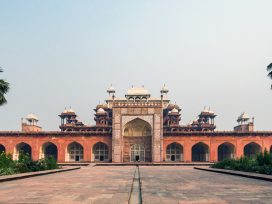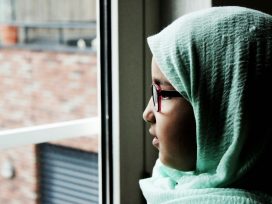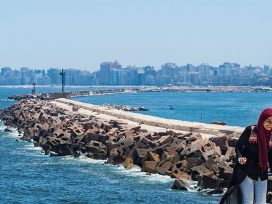Maryam Omidi: Can you start by describing your play Can We Talk About This?
Lloyd Newson: Can We Talk About This? is a verbatim dance theatre production dealing with the issues of Islam, freedom of speech and multiculturalism. And when I refer to multiculturalism I’m referring to state and governmental policy, not the notion of a multi-racial, multi-faith, diverse society, which in principle I welcome. Although, one caveat: when I say “multi-faith” I want to qualify this by saying I’m fine with faith provided it doesn’t deny other peoples’ rights, particularly those of women, gays, secularists and those of differing or other religious beliefs.
MO: Can you clarify what you mean by state policy of multiculturalism?
LN: Well, for example, under the banner of state multiculturalism successive governments have allowed more than 85 sharia courts to operate within Britain. They’re officially called sharia councils, but the Islamic Sharia Council here in Britain refers on its own website to their system as a court. They in effect operate as a quasi-legal system to British courts but do not offer Muslim women the same rights as Muslim men. Let me be specific; that’s fewer rights than Muslim men in areas like inheritance, child custody, divorce and the value of testimony. They certainly don’t offer Muslim women the same equality that British, non-Muslim women are afforded in the UK. Try being a gay Muslim and seeking equality in one of these “councils”.
MO: Freedom of speech, multiculturalism, censorship, Islam – why did you decide to focus on these themes?
LN: Previously I had made a verbatim theatre work called To Be Straight With You, which looked at the three Abrahamic religions in relation to homosexuality. We interviewed religious people, non-religious people, pro-gay, anti-gay and pretty much everyone in between. We also specifically interviewed Jewish, Christian and Muslim homosexuals. One thing was very clear: in the sample of 40 or so gay British Muslims that we interviewed, none wanted their true identity used in the work. They were fearful of reprisals, not from the white homophobes, but from within their own Muslim communities. Of course, there were one or two gay Jews and gay Christians who also didn’t want their identities revealed but this wasn’t the general pattern.
I also spoke to producers of a programme called Gay Muslims on Channel 4. They had interviewed 200 British gay Muslims and only one was prepared to have their face revealed in the documentary. Do gay Muslims only feel free to speak in the UK when their identities are hidden?
A couple of years later, in 2009, the Centre for Muslim Studies here in the UK, along with Gallup, a respected polling organization, did a survey asking British Muslims if they found homosexuality morally acceptable. They interviewed 500 British Muslims. Zero per cent found homosexuality morally acceptable, compared to 58 per cent of the non-Muslim British population.
That is extraordinary. When British Muslims are demanding respect and equality in Britain why are they falling short in reciprocating it? Tolerance isn’t a one-way street. At the heart of Can We Talk About This? is the notion of equality for everybody. I have no problem with people believing in Islam, nor believing in any religion for that matter, nor am I even against people who have strong fundamentalist beliefs, however I do have a problem when people try to use their religion to justify oppressing the human rights of others – that’s when I object to religious doctrine. What has guaranteed Muslims safety and religious freedom in Britain is that people in this country have dared to mock and challenge the beliefs and power of the Christian religion. Reason, not religion, predominantly determines our laws nowadays. In turn this has meant minority religions can peacefully worship their respective gods. There is infinitely more religious freedom in Britain than there is in Muslim countries. In fact, seven out of the ten countries ranked worst in terms of religious freedom in 2011 were Muslim countries.
It’s freedom of speech that has provided religious freedom as well as respect for women and sexual diversity in this country. And this is why free speech became a central theme in this new work, because we need to be reminded just what it has achieved for everyone, including minorities.
So I interviewed about 50 people who had first hand experience of these themes but also decided to use some existing seminal interviews around restrictions on free speech – like a discussion between Timothy Garton Ash and Mehdi Hasan, which was part of the Orwell debates. While we included a few voices on the extreme sides of the debate – we shouldn’t forget the right wing also includes right wing Islamists – most interviewees were more nuanced in their arguments. We interviewed leading writers, political figures, Muslims, ex-Muslims, women’s rights campaigners, an advisor to the UN Human Rights Council, and so on. They included people like the editor of Jyllands-Posten (which published the Muhammad cartoons), Ayaan Hirsi Ali (who’s an ex-Muslim), an ex-Dutch MP who, along with Theo van Gogh, made the film Submission for which the latter was subsequently murdered. We interviewed Maryam Namazie from One Law For All, who campaigns against Sharia being introduced in Britain and Europe.
Equally we asked British Muslims whether they felt their freedom of speech was being restricted and, if so, by whom. These included Mizanur Rahman, who was imprisoned for four years for protesting against the Muhammad cartoons outside the Danish embassy here in London and Usama Hasan, a British Imam who had received death threats from Islamic fundamentalists for suggesting the Qur’an might be compatible with Darwin’s theory of evolution. Actually there are many arguments from Islamists that I found myself sympathetic to, in terms of protecting their right to free speech. Why should Muslims be prevented from protesting against British foreign policy during homecoming parades in Wootton Bassett or Luton? A group of Muslims were attacked by EDL (English Defence League) members for burning poppies. I found that unacceptable; people have a right to peaceful protest, even if others are offended by what they say or do, provided of course they don’t break the law and incite violence in doing so.
MO: Do you think people in the UK are afraid to talk openly about Islam? Either for fear of violent reprisals or for fear of offending? Has it become a taboo subject, which you have to handle very delicately?
LN: Well it’s interesting that Lady Warsi, the first Muslim woman in the British cabinet, said that she thought it was now commonplace at dinner parties to express Islamophobia freely. I found exactly the opposite. In the white, left-liberal dinner parties I attend – and that’s essentially my demographic – people were very reluctant to discuss issues around Islam in the same way they felt able to criticise Christianity or Judaism when those religions contravened women’s rights, human rights. As soon as you suggest the same principles should apply to Islam, they go “schtum!”, or the subject matter is deflected; often a tense, nervous atmosphere develops.
MO: Why is that?
LN: They’re concerned about racism, which is absolutely a misnomer. It’s lazy to conflate religion with race. I’m not criticising a race, nor is it a blanket condemnation of a religion; it’s criticism of aspects of a religion when those aspects, religious passages, are anti-human rights. These dinner party conversations get defensive also because of the awareness of Britain’s past history of colonialism and racism. But you can’t let guilt about Britain’s past anaesthetise your brain and stop you speaking up against human rights abuses that are happening presently. Proponents of cultural relativism have played on this guilt. We should be able to take the best of all cultures but equally not be afraid to say what we don’t want, like religious violence, misogyny, homophobia, forced marriages, religious laws, racism, alcohol and drug abuse, prejudice against those who are disabled, honour-based crimes, child pregnancy, et cetera. By addressing these things, cultures change for the better. Culture shouldn’t be thought of as static.

MO: We have an interview on our site with Mark Thompson, the former director general of the BBC. In the interview he talks about Jerry Springer The Opera, which features an adult Jesus in a nappy who confesses to being a bit gay. We asked him whether he would have broadcast an equivalent of the Prophet Muhammad and he said no. Explaining, he said that Islam isn’t spread evenly across the UK and is a religion practiced by people who may already feel in other ways “isolated, prejudiced against and where they may well regard an attack on their religion [as] racism by other means.” He added that, by contrast, Christianity has “broad shoulders” in the UK. What do you think of his answer?
LN: I think it’s worrying that the former director general of the BBC says that we should be treating one religion differently to another. That Jesus’ followers don’t need as much protection as Muhammad’s followers. That view coming from a broadcasting corporation that’s supposed to be impartial, paid for by the taxpayers of Britain, explains why we needed to make this play. What is wonderful in Britain is that we don’t have Sunnis killing Shias just because the two sects disagree over who succeeded Muhammad. Ahmadi Muslims living in Indonesia and Pakistan are fearful for their lives from other Muslims who consider them heretics. The idea that Muslims experience rampant prejudice in Britain, when compared to how minority religions are treated in Muslim countries, is laughable. You’re more likely to be respected as a minority religion in a secular country because that protection is embedded in secular law, not religious law. A survey by the think-tank Policy Exchange found that 84 per cent of British Muslims believe they are well treated in British society. Of course there is Islamophobia in Britain – like there’s homophobia within the British Muslim community – but one should be suspicious about all terms ending in phobia. For example one of our interviewees, Kenan Malik, a broadcaster, writer and scientist, interviewed Sir Iqbal Sacranie back in 2005 when he was the head of the Muslim Council of Britain. Sir Iqbal Sacranie is a man who said that death was too good for Salman Rushdie and who has condemned homosexuality, and yet has been knighted. Where’s the prejudice and Islamophobia there? To add to this, in an interview with Malik in 2005, Sacranie told him that 95 to 98 per cent of those stopped and searched, under the anti-terrorism law, were Muslim. Malik went and researched that figure and it was actually closer to seven per cent. When you consider that the Muslim population in the UK have a tendency to live in major cities, have more children (i.e. younger members, who are the demographic most likely to be searched), the figure of seven per cent is proportionate to the Muslim population. Considering this interview took place just after the Madrid train bombings and just before the 7/7 Underground attacks, it seems surprising the number of Muslim men stopped and searched was that low. So why was the head of the Muslim Council of Britain exaggerating Islamophobia so adamantly? The constant yell of Islamophobia by some Muslim organisations and liberals is a default position and often at odds with the facts.
MO: Which brings me on to our fourth principle, which says we speak openly and with civility about all kinds of human difference. What do you think about this principle?
LN: If civility means courteous behaviour and politeness, what worries me is that we fight for freedom of speech, not for the right to speak politely to one another but to say the things that people often don’t want to hear. Many people are offended when I say that those passages in the Qur’an and Hadiths that discriminate against women, non-believers and gays, should be discarded or ridiculed. This should be no different than criticising and ridiculing the most offensive passages of the Bible. One of our interviewees said, “Anything of importance will offend somebody somewhere.” So if your fourth principle states you have to remain polite, I fear you’ll never say anything of importance and therefore change nothing. Who decides what offence is? The only countries in the world that have the death penalty for homosexuality are Muslim majority countries. Hence in March this year, when the UN Human Rights Council appealed for cooperation to stop murder and violence against gays and lesbians worldwide, Muslim countries belonging to the Organisation of Islamic Co-operation walked out, boycotting the session. Should the UN Human Rights Council stop protecting gays, women, child brides, victims of honour-abuse, just because these Muslim countries are offended by the very subject matter being raised? Personally I would prefer to hear the truth, even if I am offended, because then we can debate the issue, and hopefully the most coherent, humane and intelligent position will prevail. That is the importance and power of free speech.
MO: What do you think the restrictions should be on hate speech if any at all?
LN: I find the notion of hate speech a difficult one. One of the problems I have is when you start legislating for hate speech, it feels very Orwellian. It’s as if governments are trying to restrict our emotions by saying that you can’t ever feel hate. I hate aspects of religious text that subjugate women, that justify violence towards non-believers. Most of the holy books say gays should be killed. Is it unreasonable that I should hate something that advocates my death? One of the interviews we include in the work is between Salman Rushdie and Muslim reformist Irshad Manji. Rushdie says if someone hates Nazi ideology, it’s okay. It’s acceptable to say, “I hate Nazi ideology, which wanted Jews executed.” But should we be banning passages from the Bible, Qur’an or copies of Hitler’s Mein Kampf because sections advocate hatred of others? My position is it’s okay to say or publish articles saying you hate something but when this moves to incitement to violence then it is unacceptable. So what then happens with the holy books and Mein Kampf? My feeling is there is not much that can be done about historical books like these, but where we are at now, new writings and speech advocating violence against a group of people, not just ‘hating’ a set of ideas, should be restricted.
It’s important we remind ourselves that there is no such thing as unbridled free speech; there are confidentiality clauses in employment contracts; slander and libel laws; there’s the Official Secrets Act, which restricts civil servants from talking about government secrets, and laws against racist language. What concerns me, however, is the restriction of speech just because it’s offensive, or just because someone ‘hates’ it, which is why I support the current move to abolish Section 5 of the Public Order Act that allows people to be prosecuted if their behaviour is deemed “abusive or insulting” or causes “harassment, alarm or distress”. This legislation is a real threat to free speech and it’s disconcerting that such highly subjective criteria are allowed in law.
MO: We have a discussion piece on our site by Jeremy Waldron who makes the argument for hate speech legislation. He says that vulnerable minorities need to be protected and that living in a community as a vulnerable minority where people are free to abuse you will essentially lower your sense of dignity and self-worth. What do you think of his argument?
LN: I find that quite patronising, to think that some people should be treated differently to others. I absolutely believe in equality and I believe that if you have laws that offer all minorities the same rights as the majority, that’s how you start to include people in a society and stop communities fracturing. What’s more worrying is that as soon as you start introducing hate speech legislation, it’s often the minorities who become the victims. For example, British Muslims protesting against foreign policy can be seen as inciting hatred against Britain, rather than just expressing their right to an opinion and free speech. What about women, gays, apostates, secularists, who want to publicly condemn religion? So I think Waldron’s argument is contradictory, in that the hate speech he is advocating to protect minorities could in fact work against them.
MO: Your play opens with Ray Honeyford, a teacher who in the 1980s was highly critical of multiculturalism and was, as a result, labelled a racist. He died in February 2012 but many people still agree with his belief that multiculturalism promotes separateness. What are your views on this.
LN: We interviewed Mohammed Ajeeb, the first Asian Muslim Lord Mayor in Britain and Lord Mayor of Bradford at the time when the Honeyford controversy erupted. He told me that it wasn’t what Ray Honeyford said, it was how he said it. Now to me it’s interesting and curious that people could not distinguish the tone of the language from Honeyford’s arguments. Having read a lot of the material and interviewed his wife – he had the onset of dementia at the time I went up to interview him but Mr and Mrs Honeyford gave us permission to use any of his writings – I agree some of his language was intemperate. In fact, within the seven minute scene about him there are only two people who support Honeyford and they have three sentences between them. But we also acknowledge Honeyford was concerned that many of his students – of which over 90 per cent were Asian – didn’t have adequate command of English in the early ’80s in Bradford and that it wasn’t a racially mixed school. Hence he felt they were losing out because the school was not more culturally mixed and Bradford’s multicultural education policies were encouraging racially segregated schools. Honeyford saw his task as preparing students to live and work in Britain, so his Asian students needed exposure to, and a strong command of, the English language and English culture; he wasn’t simply denying the positive values of Asian culture. Ironically, sometimes he was careless in his own use of language but beyond all the rhetoric, from both sides, his desire for an integrated society often got lost. We also interviewed Ishtiaq Ahmed, who’s associated with the Council for Mosques in Bradford. He did a survey in the late ’90s and there were students in Bradford who went to Asian nursery schools, Asian primary schools, Asian high schools and also colleges where they virtually never mixed with non-Asians. This is complicated, because there’s the issue of white flight, the issue of councils often dumping Asian families into poor areas.
Honeyford was forced to resign in 1985. In 2001 the Bradford race riots erupted and many feel if we had acted on Honeyford’s central arguments and not been distracted by his tone, these riots may not have occurred. This year the Organisation for Economic Co-operation and Development published a report saying Britain’s schools were some of the most socially and racially segregated in the world.
On the flip side, some Muslims we interviewed for the project were so determined to have their children well integrated into British society that they took them out of Asian schools to put them into predominantly white schools; they felt that their chances of integration and of achieving would be higher. There were some Asian families who supported Honeyford and wanted their children to be educated at his school but were physically assaulted trying to get their children past families boycotting and picketing the school. The Honeyford saga is complicated and the principal reason we present it is because it shows that while Honeyford wanted to discuss the problems of multicultural education policies, he was censored – not only by angry parents but also the Local Education Authority. Where was his right to free speech? Does he surrender this because he’s a head teacher? Yes, he should have chosen his language better but again freedom of speech should not just be reserved for diplomats.
MO: Was there ever a concern at any point that you might be perpetuating stereotypes about Muslims and indeed may be encouraging Islamophobia?
LN: No, at least not from my perspective. Going back to the survey where 100 per cent of British Muslims said that homosexuality was unacceptable, who’s doing the stereotyping there? Not me. We included a wide range of Asian and Muslim voices within the work; traditionalists, moderates, and apostates, from an Imam who received death threats, to members of progressive as well as conservative Muslim organisations, Islamists, ex-Muslims, a reformist lesbian Muslim. Many of our Muslim interviewees hold opposing views to one another. Roughly half of the voices we finally chose to use in the work come from Muslim backgrounds. Considering this, along with the range, representation and intellectual calibre of our interviewees, it’s hard to suggest we’re stereotyping, because it’s their words that are heard on stage, not ours. Whether you’re offended by them is another matter.






